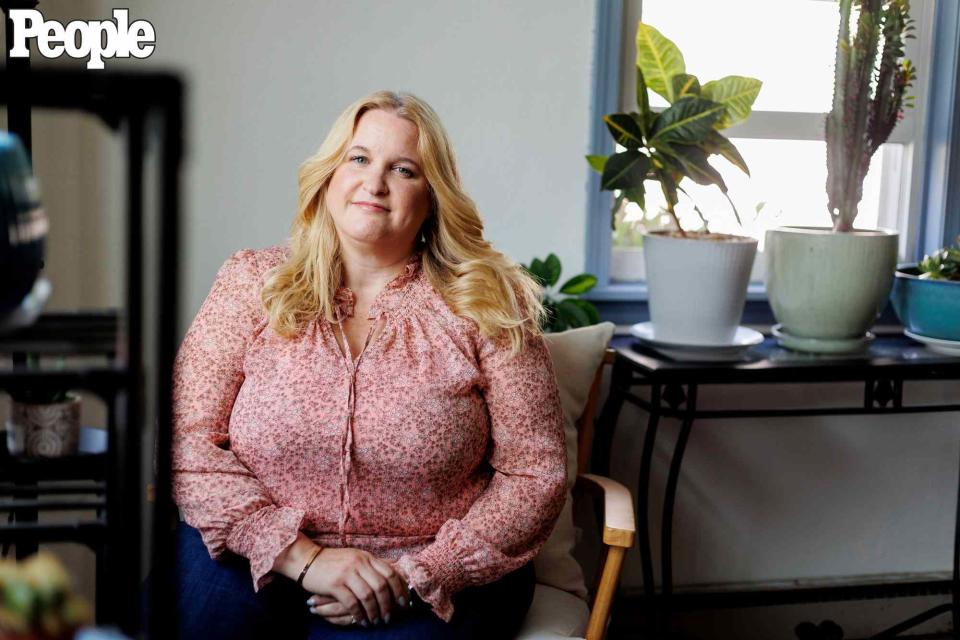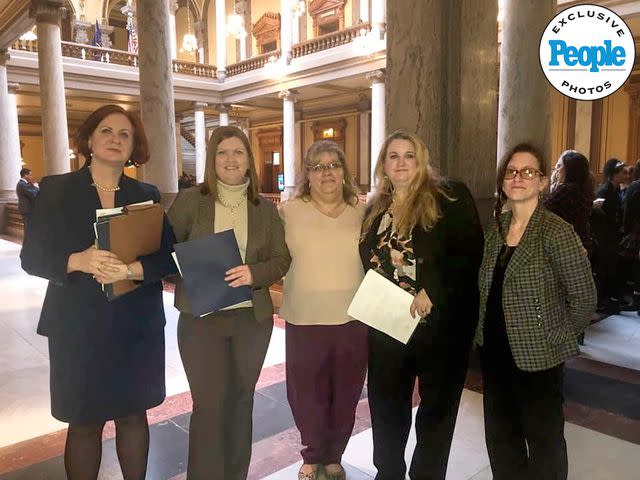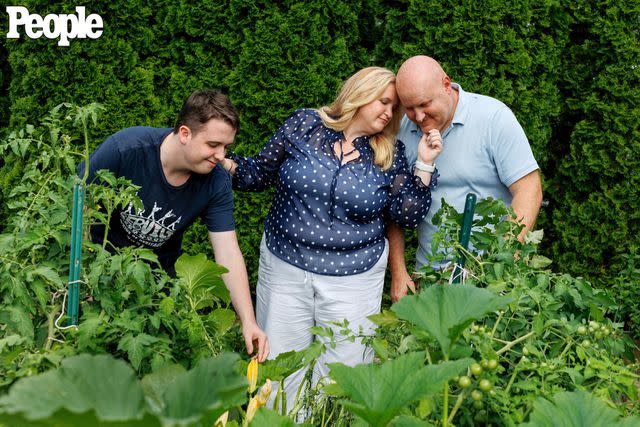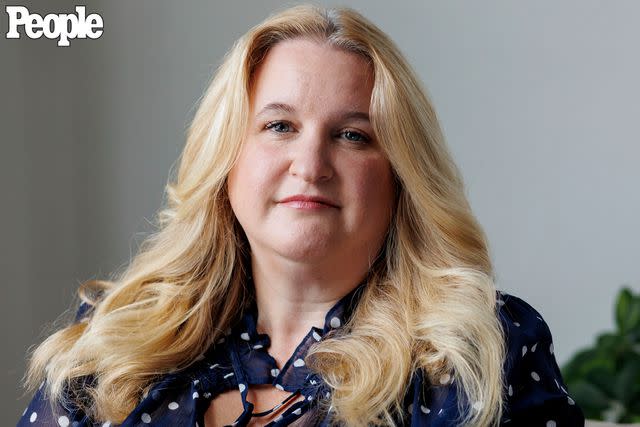Former Child Bride Now Fights to Abolish Underage Marriage: 'America’s Dirty Little Secret' (Exclusive)
At 15, Genevieve Meyer was forced to wed a 43-year-old man — now she’s determined to prevent other women from having to endure ‘the nightmare’ she survived

Laura McDermott
“We need to stop pretending this doesn’t happen here,” says Meyer at home in July 2023..On her wedding day a few weeks after she turned 15, Genevieve Meyer — wearing a faded black and white polka-dot dress that had been given to her — stood before a judge at a courthouse in Jackson, Miss., fighting to keep from vomiting.
“I’d tried putting on makeup,” she tells PEOPLE, “but I was crying so hard that I just gave up.”
It was no wonder. Meyer’s groom was 43-year-old John Malloy, a twice-divorced, unemployed tree trimmer who had been arrested a few months earlier on a charge of molesting Genevieve, then 14, in the California trailer park where they both lived. Meyer’s drug-addicted mother saw an opportunity to palm off her daughter on Malloy, since the charges against him would be dropped if he married Genevieve. (Malloy has not responded to PEOPLE's request for comment.)
And so the two drove cross-country to a state where they found a judge willing to perform the ceremony. “I kept telling myself, ‘Maybe it’s not gonna actually happen,’ ” says Meyer, now 43. “But when the judge took out this little book and started reading from it, I remember feeling lightheaded and nauseous . . . and just trapped.”
Nearly three decades after that spring morning in 1995, Meyer’s life has improved exponentially. After divorcing Malloy in 2000 and surviving a second failed marriage, she is a mother of four who has been happily wed for the last 15 years to Nick Meyer, 47, an industrial painter. Living in Hoagland, Ind., Meyer has dedicated herself to changing state laws that, between 2000 and 2008, allowed for nearly 300,000 minors (mostly girls) to marry adults.
“This really is America’s dirty little secret,” says Meyer. “I wish I hadn’t gone through what I had to endure, but it’s been healing to prevent this from happening to other girls, to bring our community together and empower survivors.”

Courtesy Genevieve Meyer
Meyer (second from right) at Indiana’s Statehouse in 2020 after the legal age for marriage was—in most cases—raised to 18.Growing up in California’s San Bernardino County, Meyer’s life was one of chaos. By the time she was 6, her father had left and her mother had married a homeless 17-year-old who — like her mom — was fighting a losing battle with drugs and alcohol. Constantly on the move from one house to another, the whip-smart youngster, who loved school but rarely attended it, spent her days tending to her younger sister.
“The tension in the household just kept rising,” says Meyer. “I started to feel like I wasn’t gonna make it. The future seemed so dark.”
Her marriage to Malloy only made things darker. Because of his substance abuse, he rarely worked, and Meyer often went hungry. “The only saving grace,” she says, “was that he would get really drunk most nights and pass out.”
Never miss a story — sign up for PEOPLE's free daily newsletter to stay up-to-date on the best of what PEOPLE has to offer, from celebrity news to compelling human interest stories.
Soon she was supporting the two of them while working a string of jobs, determined to someday break free. “The more independence I got,” she remembers, “the more aggressive and violent he became.”
At 18, she moved out. The years that followed were filled with numerous personal triumphs, like getting her own apartment and going to work for H&R Block, where she prepared taxes despite only having a sixth-grade education. But there were also devastating setbacks that included a violent rape behind a dumpster and stints of homelessness.
“My story,” says Meyer, “is actually a more mild version of what a lot of child brides endure.”

Laura McDermott
“I’ve found healing,” says Meyer (in July 2023) with husband Nick and her son Robert in the family’s backyard.Refusing to let her past hold her back, Meyer threw herself into forging a new life, receiving her GED in 2008, then using scholarships to earn two bachelor degrees by 2016 and a master’s degree in business in 2018.
But it was sharing her journey (“I honestly didn’t think anyone would find it interesting,” she says) at a 2018 program held at a public library in Fort Wayne that empowered her to launch the Resiliency Foundation.
The nonprofit, run by other survivors of child and forced marriage, provides a range of services to survivors that include connecting them to mental health and legal services, housing, food, transportation and advocacy workshops.
“Child marriage is such an isolating experience that can be difficult for others to understand,” says Meyer, who has helped train over 3,000 social workers, police officers and healthcare workers to identify victims of these unions. “We’ve created a sisterhood of support to give people a voice to say, ‘We couldn’t speak up about was happening when we were adolescent girls, but now we can, and it’s not right.’ ”

Laura McDermott
“Child marriage is wrong,” says Meyer (in July 2023). “The solution is simple: Raise the legal age to 18.”With members of her group, Meyer has been actively pushing to change state laws that allow anyone under 18 to marry. They’ve shared their harrowing stories with legislators and have contributed to the passing of stricter marriage laws in 17 states, most recently Michigan, where a 2023 bill raised the minimum age of consent for marriage to 18.
“In a lot of states, child marriage laws contradict child safety laws,” says Meyer, who now serves as the head of anti-human trafficking efforts at the Indiana Youth Services Association. “Like in my case, if there was a marriage, then suddenly the criminal charge would go away.”
The life Meyer leads today — with her husband and kids, Ashley, 23, Autumn, 20, Robert, 19, and Maddy, 15 — bears little resemblance to her tumultuous early life. “I have a fantastic support system and a very healthy marriage,” says Meyer, who spent years working with therapists.
Asked how her life might have turned out differently if, decades ago, she’d had access to the resources she’s now helping to provide for others, Meyer replies, “I would have absolutely chosen Door B — and I would have walked through."
For more People news, make sure to sign up for our newsletter!
Read the original article on People.

 Yahoo Sports
Yahoo Sports 
